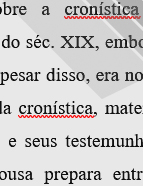

................................
Her contributions to a systematisation of information on medieval chronicles in Dicionário da Literatura Medieval [Dictionary of Medieval Literature] (1993), together with those of Luís Krus, allow us, even today, to establish a more reliable state of play. But also noteworthy for their importance as works of in-depth analysis are the studies of a more historiographical nature by João Gouveia Monteiro (Fernão Lopes. Texto e Contexto [Fernão Lopes. Text and Context], 1988) and Margarida Ventura (O Messias de Lisboa. Um estudo de mythologia política [The Messiah of Lisbon. A study in political mythology], 1992). In recent years, this chronicler has continued to be widely revisited, with many researchers returning to the questions raised by historians in the mid-twentieth century and, above all, beginning to look at his texts as the result of a politically oriented production. Luís de Sousa Rebelo, with his work of 1983 A concepção do poder em Fernão Lopes [The conception of power in Fernão Lopes], highlighted precisely that point and influenced many researchers who, when not having already done so, subsequently abandoned the notion that Fernão Lopes recorded the "truth with no other mixture", as he himself claimed and as many still believed.
Zurara also continued to be widely studied by authors such as Larry King, who edited the diplomatic edition of the Crónica do Conde D. Duarte de Meneses [Chronicle of Count D. Duarte Meneses] in 1978, Luís Filipe Barreto, Luís de Albuquerque, Humberto Baquero Moreno and even Torquato Soares, who published the Crónica da Guiné in 1981. In comparison, and although Manuel Lopes de Almeida published almost all Zurara’s work in 1977, the work of Rui de Pina and Duarte Galvão did not receive the same attention in the second half of the 20th century or even in the 21st century, except for some recent studies by Filipe Alves Moreira. In line with Lindley Cintra and Diego Catalán, Filipe Alves Moreira has indeed emerged as one of the main contributors to a renewal of chronicle production studies this century. In addition to his in-depth study of the Crónica de 1419 in 2013, which he attributed to Fernão Lopes (thus joining an ongoing controversy dating back to the 1940s, which has remained unsolved), his search for the Primeira Crónica Portuguesa [First Portuguese Chronicle] (2008) is also noteworthy. In this regard, following Cintra's intuition that there was a chronicle in romance preceding the Crónica de Portugal e Espanha de 1341-1342 that diverged from all those known to date, this chronicle scholar accomplished the work that his masters had left unfinished.
